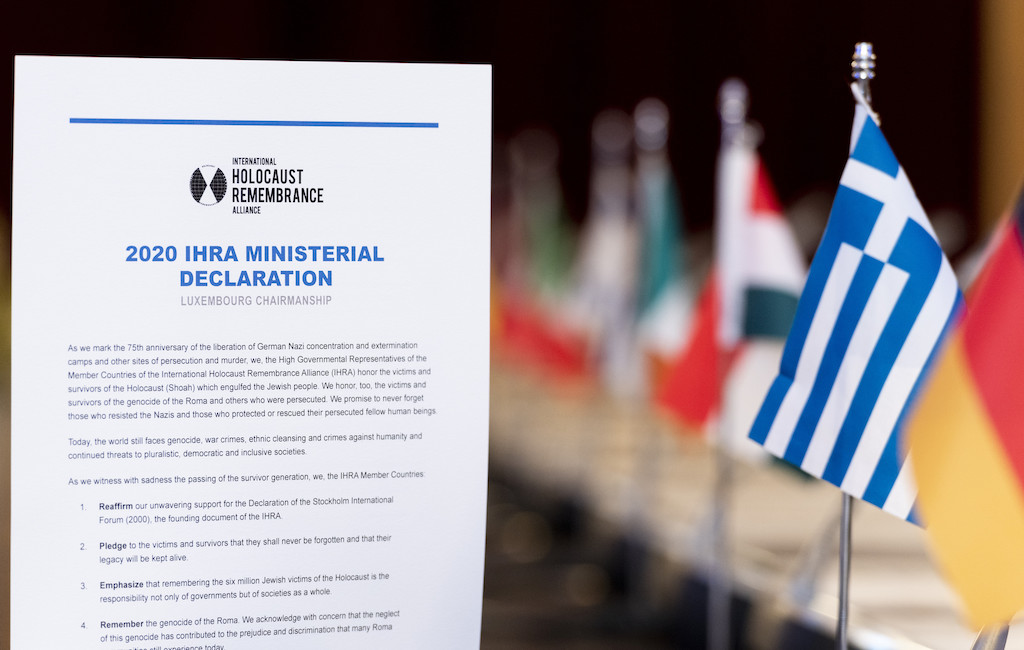Australia/Israel Review
Europa Europa: Empty words
Mar 28, 2024 | Alex Benjamin

“It’s not worth the paper it’s printed on!” Rome, last month. At a meeting of Jewish leaders from all over Europe, this frustrated, almost plaintive assertion came from one of the presidents of the Dutch Community. Vigorous head nods from other Jewish leaders showed this attitude wasn’t unique to either the speaker, Ellen van Praagh, or the Netherlands.
Van Praagh was referring to the many European plans in place designed to counter hate speech and antisemitism, as well as the International Holocaust Remembrance Alliance (IHRA) working definition of antisemitism.
Back in 2021, amidst the COVID pandemic and a worrying rise in antisemitism across the continent, the European Commission published its strategy for combatting antisemitism. In it, the Commission invited the European Parliament and the European Council to support the implementation of the strategy, and promised to publish comprehensive implementation reports in 2024 and 2029.
Member states were also urged to adopt measures and develop national strategies for combatting antisemitism based on the plan. Many did. A great many also signed up to adopt the IHRA definition of antisemitism, trumpeting it in the media.
Yet “the proof of the pudding is in the eating,” the old adage says.
Today, across Europe, reported or documented cases of antisemitism have gone through the roof since October 7. In places where there is proper data collection – such as the UK, Spain and France – the rise is over 1000%. Even prior to the Hamas pogrom, the numbers were already concerning.
Today we are looking at levels of antisemitism last seen in 1939 in Nazi Germany. And that is not hyperbole.
In Holland, they cancelled Holocaust Memorial Day events at universities over security concerns and because of vociferous opposition. Just recently, there were massive protests as Israel’s President Isaac Herzog opened a new Holocaust Museum in Amsterdam. In Spain, even before October 7, the Israeli Ambassador was forced to take shelter in a safe room at a university as a pro-Palestinian mob chased her entourage.
In capitals across the continent, there are regular protests where one can often see Nazi images referring to Jews, images drawing parallels between Gaza and Auschwitz, and calls for Jewish genocide and ethnic cleansing “from the river to the sea.” You can read placards calling Jews terrorists, and the blood libel of child killers is regularly used. Death threats against rabbis are common. European citizens who have served in the IDF are outed in their communities through letter campaigns pointing out that a “child killer” is living next to them. Flights arriving from Israel are tracked and met by protesters.
I was in London recently visiting family and was genuinely shocked at the number of people with anti-Israel stickers bearing the entirety of Israel marked out in Palestinian colours with a gun beside it, or a paraglider motif. It was no longer my city, and it confirmed what UK Rabbi Avi Lazarus had told us in Rome: he just doesn’t feel safe as a “visibly Jewish” person there anymore.
Strategies, national plans, the adoption of the IHRA definition? At this stage, they appear to have been nothing more than virtue signalling, with no visible or demonstrable practical application across Europe today.
This was the message from Jewish community leaders in Rome. The words, plans and guidance adopted had not trickled down to ground level. Police are hamstrung at openly antisemitic protests, and the courts have no framework to prosecute the anti-Zionists and antisemites who have made collective Jewish life here in Europe hell, and who feel they can act with impunity.
Care to hazard a guess what the number one cost today is for Jewish communities? Security. In many communities, Jews are on their own, footing the bill for private security and equipment, funds that could be used for schooling, community development and infrastructure, or festivals.
The EU just put out a call for funding the security of Jewish institutions, but the bureaucracy is often so cumbersome that, as one prominent Rabbi put it, “it’s like asking someone to fill out a lengthy insurance form while your house is on fire.”
The EU strategy in 2023 was updated to include the words “fostering Jewish life” after combatting antisemitism.
Any strategy is eventually put to the test in the real world and by any yardstick, the “EU Strategy on Combating Antisemitism and Fostering Jewish Life” is failing miserably. Van Praagh was right. If governments are not prepared to turn words into action, the words are simply not worth the paper they are printed on.
Over the next month, even as many of us are paying for our own security, European Jewish leaders are bringing together some prominent lawyers to find ways of putting the EU’s well-meaning but useless words into some actionable legal frameworks. It seems that the Jews have no choice but to “foster” their own communal life. It has ever been thus.






